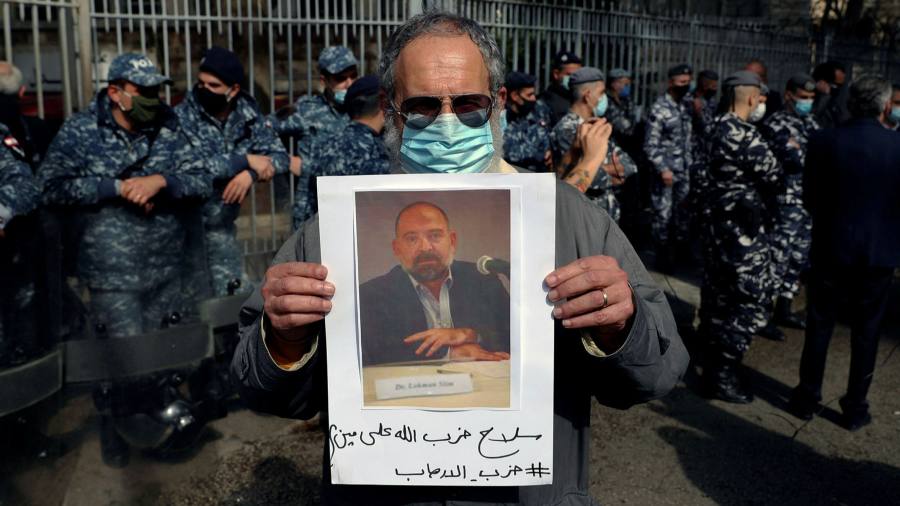[ad_1]
A prominent critic of the Lebanese militant group Hizbollah was found shot dead on Thursday, raising fears among activists that his killing was a message to opponents of the country’s ruling class.
Security officials confirmed the death of Lokman Slim, who in the past had complained of death threats, but said there were no suspects as yet. The 59-year old’s body was found in a car in majority Shia southern Lebanon, where Hizbollah is dominant.
The publisher and activist, who was born into a Shia Muslim family, was active in Lebanon’s October 2019 mass protest movement that denounced all political parties — including powerful paramilitary and political party Hizbollah.Â
Slim’s killing “bodes very illâ€, said Sami Nader, director of the Levant Institute for Strategic Affairs, who saw Slim last week, describing it as “a message for the opponents in the Shia communityâ€.Â
Lynn Maalouf, Amnesty International’s deputy regional director for the Middle East and North Africa, said the activist was the victim of a “reigning pattern of impunity”, in which political murders have gone unpunished: “His shocking killing raises serious fears of a return to targeted killings, fears made all the more acute by the state’s failure to deliver any justice for past similar horrific incidents.”
Lebanon, for a brief period seen as a haven of relative stability in the febrile Middle East, has been hit by an economic crisis and political turmoil, compounded by the pandemic. Thursday marks six months since the Beirut port disaster that devastated the country’s capital and reignited mass protests against the government.
Slim “is the perfect example of a pro-democracy activist,†said Mr Nader, adding that he was well known for briefing foreign officials, prompting Hizbollah supporters to tar him with the pejorative slur “the Shia of the Embassiesâ€.
In late 2019, Slim said he had received death threats and warned that he believed Hizbollah would target him.
Despite the warnings, Slim had continued to speak out. During a televised interview with Saudi-funded Al Arabiya channel last month, Slim linked the stash of ammonium nitrate, which caused the explosion in Beirut in August, to the Syrian regime’s use of barrel bombs during the civil war.Â
“This is a war crime involving Moscow, Damascus, and Beirut,†Slim said. Russia, Iran and Hizbollah back the Syrian regime.
Assassinations of politicians and journalists were once common in Lebanon. Slim’s own Memory at Work project had gathered accounts of the killings. The most famous was the murder of former prime minister Rafik Hariri who was killed by a car-bomb in 2005. An international court last year charged a Hizbollah member in absentia for the crime.
Although such assassinations had become rare, a string of mysterious deaths in the past year has put Lebanon on edge. The most recent was the killing of a part-time photographer who had worked with the Lebanese army, shot dead in his car in broad daylight.
After news of Slim’s killing broke on Thursday, Jawad Nasrallah, son of Hizbollah’s secretary-general Hassan Nasrallah, wrote in a tweet: “the loss of some is actually an unaccountable gain and kindnessâ€. He later deleted the tweet.Â
“The current regime is totally bankrupt,†said Mr Nader, referring to the political parties, including Hizbollah, which collectively hold sway over Lebanon. “So now it’s through violence that they can sustain.â€
Slim was from Haret Hreik, a predominantly Shia area of Beirut, where he based the UMAM Documentation and Research centre, founded in 2005. There he would show visitors artefacts from the overflowing archives, a unique record documenting history in Lebanon and across the region, that many would rather forget.
Slim had co-founded publishing house Dar al Jadeed in 1990, and established civil society organisation “Hayy Binaa†in 2005. Along with his wife Monika Borgman he made two documentaries focused on atrocities — one about the 1982 massacre in a Lebanon refugee camp, and another about Lebanese held in a Syrian prison.
Additional reporting by Asmaa al-Omar in Istanbul
[ad_2]
Source link





